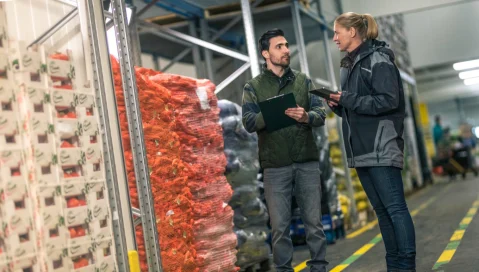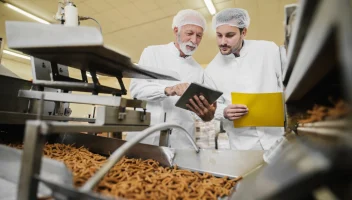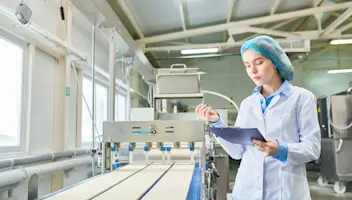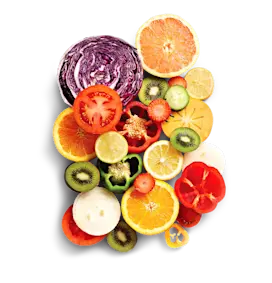Mastering Material Requirements Planning: 5 Keys for Food and Beverage Businesses
Mastering Material Requirements Planning: 5 Keys for Food and Beverage Businesses
Mastering Material Requirements Planning: 5 Keys for Food and Beverage Businesses
23 Feb 2022
Jack Payne
Famous American inventor Thomas Edison is credited with saying, “Good fortune is what happens when opportunity meets with planning.” In other words, success doesn’t just come about as a natural result of the passage of time—it is something that one will only achieve by identifying a good idea, formulating a sound strategy and making a deliberate effort.
There are many ways that the truth in Edison’s words can become evident in a food and beverage business setting, but it is perhaps most apparent when it comes to tuning your ingredient purchasing and production levels according to demand. This practice, known as material requirements planning (MRP), is crucial to your company’s profitability and efficiency goals.
With this post, we’ll cover some key MRP best practices and how an industry-specific enterprise resource planning (ERP) solution can help your organization create and execute an optimized plan for material procurement and use in product manufacturing.
1. Ensure Accuracy
As part of IDC’s Global Food and Beverage Industry Trends and Strategic Insights 2021 whitepaper commissioned by Aptean, survey respondents selected big data and analytics as the technology to have the greatest impact over the next 5 years. That demonstrates that industry leaders recognize data as a priceless asset—but that, of course, must be based on the assumption of accuracy.
All the facts and figures in the world will amount to nothing if they’re incorrect, mislabeled or improperly calculated. With myriad measurements to be taken and key metrics relying on the precision of your records, can you really trust the logging process to individual employees using manual methods?
That’s why the right call is to automate the data collection process with your ERP. By integrating with smart sensors and other IoT devices, a purpose-built system can seamlessly capture and import readings and performance statistics without the risk of human error. Meaning your decision-makers can act on complete, accurate information at all times.
2. Manage Inventory Effectively
Food and beverage businesses’ materials are frequently perishable, making their careful management vital for getting the most out of what you’ve paid for. Expired, unsold goods are a leading cause of losses for companies like yours, meaning your margins are on the line if you fail to properly account for the freshness ranges of your ingredients.
An ERP’s fully digital nature and integration with handheld barcode scanners greatly simplifies matters, as you’ll be able to record and track expiration dates down to the lot level. The interface makes them highly visible, too, and advanced food and beverage platforms like Aptean Food & Beverage ERP can facilitate the implementation of a first-expiry, first-out (FEFO) picking method so that you know your staff are always following proper procedures.
3. Prioritize Demand Planning
Good planning requires some degree of foresight—but in the fast-moving food and beverage market, it can be difficult to know what the future holds. Seasonality, adverse weather events and shifting consumer trends can each have dramatic impacts on demand that could lead to shortages or surpluses on your end.
It’s a good thing, then, that most food and beverage ERP solutions have built-in forecasting tools that can combine historical sales patterns and ongoing fluctuations to give you a clear picture of what to expect down the road. With the right system on your side, you’ll be able to align your purchases of raw materials according to what you can realistically produce and sell given the circumstances.
4. Audit Vendors Regularly
Maintaining continuity with your suppliers has its benefits—you can establish a rapport with their teams, and using the same source for your ingredients routinely will help establish consistent texture, taste and quality. But just because certain relationships have worked well in the past doesn’t mean they will remain satisfactory indefinitely.
Using a food ERP system’s traceability features and vendor modules you can compare anticipated lead times to actual delivery dates and assess just how well your supply chain partners are holding up their end of the bargain. You’re able to analyze trends and flag anomalies, including incorrect and incomplete orders, and consider switching suppliers if better opportunities arise.
5. Understand Your Capacity
It’s a simple fact that your warehouses can only hold so much inventory before they’re bursting at the seams. The same goes for your production facilities—there are limits to your uptime even in the most ideal situations, and jam-packing your schedule with ambitious targets won’t do much good if your machinery and staff are already overwhelmed.
Having a firm grasp of your actual capacity is crucial for your MRP purposes. After all, only when you know exactly how much physical space for storage you have and what you can realistically crank out over a given time period can you make purchases with confidence and set output goals that are ambitious, yet attainable.
Additional ERP Advantages
With those MRP best practices and explanations of how to utilize your ERP platform throughout the process, you should have a basis for forming a solid approach to materials procurement and use. But before we close, it’s worth looking at how important technology is when you’re trying to both proactively plan for the future and remain agile and adaptive in the present.
Aptean Food & Beverage ERP has features to keep your operations flexible, including sector-specific tools to tackle unique challenges and mobile functionality for on-the-go personnel. What’s more, we also offer cloud deployments for companies that are looking to be prepared for remote work scenarios and on-the-fly adjustments.
We also can boast excellent reliability, with 99.9% system uptime or better, thanks to our dedicated IT teams and, in the case of cloud implementations, redundant offsite servers. This all comes backed by decades of collective experience in food and beverage and an in-depth knowledge of best practices that we are eager to share with our clients for mutual success.
So, ready to hear more about how our food ERP can help you nail your MRP efforts? Contact us today, or schedule a personalized demo.
Related Content





Sind Sie bereit, Ihr Unternehmen grundlegend zu verändern?
Wir bieten Ihnen die spezialisierten ERP-Lösungen, die Sie für die Herausforderungen Ihrer Branche benötigen.



